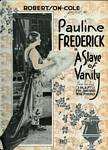

A Slave of Vanity (1920) Robertson-Cole Studios, Inc. Distributor: Robertson-Cole Distributing Corp., Super-Special. Director: Henry Otto. Scenario: Henry Otto. Cast: Pauline Frederick, Nigel Barrie, Willard Louis, Maud Louis, Daisy Robinson, Arthur Hoyt, Ruth Handforth, Howard Gaye. 6 reels. This film appears to be LOST
| A poster for Slaves of Vanity (Thanks to David Menefee) |
 |
"A Slave of Vanity"
Robertson-Cole Presents Pauline Frederick in Pinero's "Iris" in Sumptuous Production
Reviewed by Epes W. Sargent.
Offering a combination of a powerful emotional star and a thoroughly competent support in a really gorgeous production of one of the best of Pinero's plays, in a "A Slave of Vanity," leave little that can be desired.
The story of Lady Bellamy has become a part of dramatic literature and this production follows the original script closely to the end where, in deference to the exhibitor convention which requires that all stories must end happily, the powerful drama is shown to have been "only a dream" which pays a powerful tribute to the dinner scene which opens the story and to Lady's Bellamy's imagination and inventiveness. To those who know the drama, this timeworn expedient comes in the nature of a shock, but otherwise the production, from all angles, is remarkably good.
The photography is better than good; it is artistic and the cameraman has been given a succession of unusual interior sets, sometimes bizarre, but always in keeping.
Miss Frederick leaves little to be desired in her interpretation of her role, responding fully to the emotional demands. Willard Louis overtops Niegel [sic] Barrie because of the greater strength of his part; which he handles with admirable discretion. Arthur Hoyt is excellent in a minor role, which he forces to stand out in the brief opportunities offered him, and the others are all wholly within keeping; an unusually excellent ensemble.
Cast:| Iris | Pauline Frederick |
| Laurence Trenwith | Nigel Barrie |
| Frederick Maldonado | Willard Louis |
| Fanny Sullivan | Maude Louis |
| Auren Vyse | Daily Robinson |
Adapted from the play by Arthur Wing Pinero.
Scenario and Directed by Henry Otto.
Length, Six Parts
The Story:
Lady Bellamy, "A Slave to Vanity," is also a martyr to selfish love, for her husband, dying, has left her his fortune on condition that she does not remarry. Laurence Trenwith can offer only youth, breeding and sincere affection. Frederick Maldonado, a banker, offers a fortune in excess of that which she will lose, but weighted heavily by his personality. She is torn between love of ease and love for Trenwith. The trustee of her estate absconds leaving her utterly penniless. Trenwith goes to America to seek a fortune. She refuses his impassioned pleas that she go with him. The banker places a deposit at her disposal, ostensibly as a friendly loan, but he foreclosed heavily when the fund is exhausted and seeks to press his claims. She resists, but eventually she yields to the point of accepting the hospitality of his home. Trenwith returns to find her Maldonado's guest, and takes his departure and the banker, stung both by her contempt of him and her love for Trenwith, turns her again into the streets from which he rescued her. She wakens to find this but a dream and promises Trenwith to go with him to America and share his uncertain fortunes.
Exploitation Angles: See the special exploitation page in this issue.
Special Exploitation Page
CATCH LINES
for
"A Slave of Vanity"
The rich widow loved a poor man, but if she married she would lose her fortune. What did she do?
Her Fortune was lost by her lawyer's abscondence. Would she marry her poor lover now?
She was six and twenty and independently rich, but why was she so unhappy?
Would a poor man marry a widow whose fortune had been suddenly swept away?
He called her "Divinity" but to her he was as repulsive as he proved to be sinful.
Luxury was the salt of her life and yet she learned to endure poverty so that she could marry the poor man she loved.
His very homeliness convinced him he had no chance to win the woman of his heart, but it did not stop his doge-like devotion.
He was a financier--aptly described as a pawnbroker with an imagination.
He came back like a thief in the night, but only to love the woman he could not marry.
She thought the artist was working, but he was only sketching her ankles.
When is the wisest moment for a couple deeply in love with one another to say "Goodbye"?
He said her lover had been too busy with his baggage to send a farewell message. Did she believe that?
She was a woman reared in luxury but she lost her fortune. Should she accept the open check offered by he lover's rival?
Her lover had been away for months and when he returned, she could not kiss him.
Last revised, September 24, 2005